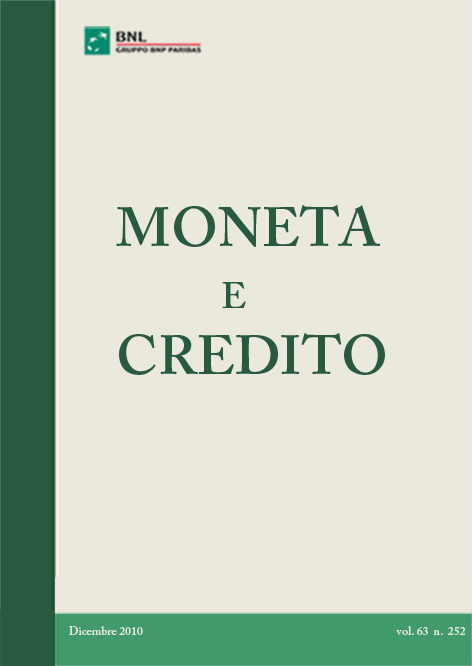Introduzione
DOI:
https://doi.org/10.13133/2037-3651/9507Keywords:
Introduzione, Crisi finanziaria, regolazione finanziariaAbstract
The three articles included in this issue of the journal (along with the usual book reviews and received books sections) are heterogeneous with regards both to the topics and methods. They once again show how wide and differentiated the post-crisis economic debate is.
JEL Codes: F3, G1, N1, B5
References
CIOCCA P. (2010), "Kindleberger e l’instabiltà", Moneta e Credito, vol. 63 n. 251, pp. 209-26.
CONTE L. (2010), "Kindleberger economista, storico del capitalismo", Moneta e Credito, vol. 63 n. 252, pp. 325-339.
PASINETTI L. (2010), Keynes e i keynesiani di Cambridge. Una "rivoluzione in economia" da portare a compimento, Laterza, Roma-Bari.
PERROTTA C. (2010), "Kindleberger e le leggi dello sviluppo. Un commento alle "lezioni Mattioli" (1989)", Moneta e Credito, vol. 63 n. 251, pp. 227-51.
REATI A. (2010), "Perché la teoria post-keynesiana non è dominante", Moneta e Credito, vol. 63 n. 252, pp. 341-363.
RONCAGLIA A., (2010), "Economic policy dilemmas in front of the crisis", PSL Quarterly Review, vol. 63 n. 254, pp. 181-185.
RONCAGLIA A. (2009), "Le regole del gioco, l’instabilitá e le crisi", Moneta e Credito, vol. 62 n. 245-248, pp. 3-12.
SARCINELLI M. (2010), "’Europa 2020’, nuovo governo economico e ri-regolamentazione finanziaria: incentivi o vincoli alla crescita?", Moneta e Credito, vol. 63 n. 252, pp. 291-324.
SAVONA P. (2010), "Kindleberger studioso di economia internazionale", Moneta e Credito, vol. 63 n. 251, pp. 189-207.
TONVERONACHI M. (2010), "Empowering supervisors with more principles and discretion to implement them will not reduce the dangers of the prudential approach to financial regulation", PSL Quarterly Review, vol. 63 n. 255, pp. 363-378
Downloads
Published
Issue
Section
License
All material in this website and every article published by the review are licensed under a Creative Commons Attribution - Non commercial - No derivates 4.0 International license. Authors retain all rights on their works and grant the right to first publication to the review under the aforementioned license.


